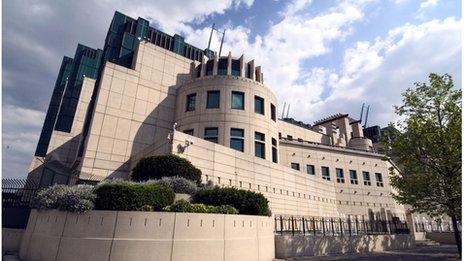Analysis: A question of secret courts
- Published
- comments
The headlines on the Justice and Security Bill suggest a massive government climb-down on secrecy in inquests. But the fact is that the core purpose of this very controversial legislation remains: to protect national security information at all costs.

Binyam Mohamed: The case that started it all
So let's take a few steps back from lofty legal talk of open justice and look at practical examples of what this is all about.
The key aim of the bill is to allow the courts to close their doors more frequently when they are dealing with cases involving national security.
The easiest way to understand that is to think about cases where someone is alleging that MI5 or MI6 are guilty of, or complicit in, wrongdoing.
Binyam Mohamed was detained in the wake of the US-led invasion of Afghanistan. Pakistani interrogators first beat him and then the US organised his rendition to Morocco. He was tortured and, at one point, they took a scalpel to his genitals.
He ended up in Guantanamo Bay. His British lawyers fought a long-battle to prove that London had some indication of his treatment before he was taken to Morocco.
They argued that information helped prove that any confession he had made was worthless, because people will say anything to stop the pain. That is why international law bans torture.
Ken Clarke: Bill "is less than perfect but the alternative is silence"
Now, Binyam Mohammed won his case and we know, in seven highly sensitive paragraphs, external, what Washington told London.
The question at the heart of the bill is whether that kind of national security information can ever be made public?
The government's answer is no - and it wants to use a "Closed Material Procedure" (CMP) to protect the information.
CMP was created in the late 1990s and is a key feature in terror deportation cases like that of radical Jordanian cleric Abu Qatada.
It is also fundamental to court cases where terrorism suspects challenge restrictions on their liberty, known as T-Pims (the system that used to be called Control Orders).
Special Advocates
The suspect hears part of the case against them - but not all of it. A point comes when they have to leave the court, the doors are locked and government lawyers reveal the "closed" case - the full Security Service assessment of the danger posed by that individual. For example, MI5 may have intelligence that the individual was planning to join a terrorism training camp in Pakistan.
The Security Service may not want that information in the public domain because it either gives clues to how the person is being monitored or reveals the identity of an informant. The intelligence could also be a tip-off from a foreign agency.
A security-vetted lawyer - known as a Special Advocate - acts for the suspect or deportee, but cannot talk to them once they have had read the secret case. Now, critics say that if the Special Advocate cannot ask the suspect to respond to the allegation that he was planning to attend a camp, then the lawyer cannot properly challenge the govenrment's case.
And that's why many lawyers say the system is manifestly unfair, even though the European Court of Human Rights has ruled that it isn't.
Government accused
The government wants to extend the system into other parts of civil law, such as damages claims or "judicial review" cases, where ministers or agencies are the accused. It won't be used in criminal trials - but ministers say they need CMP to defend themselves. Reading University has compiled a comprehensive list , externalof cases that might be affected by more CMP.
At present, when someone sues the government, ministers must account for their actions in open court. If ministers want to protect a sensitive document, they can seek use a procedure that withdraws that evidence from the case so neither side can rely on it.
Under the new system, where a case involves national security, part of the defence would be under the Closed Material Procedure.
When former Guantanamo Bay detainees sued the UK, accusing security and intelligence services of being complicit in American wrongdoing, they demanded disclosure of government papers which they said would prove their case.
They never saw all the material because the government paid them millions to drop the claims. Ministers were determined at whatever cost to prevent sensitive techniques, sources and intelligence from being made public.
But ministers felt that they had not been able to defend themselves in this case because the Closed Material Procedure could not be used.
Critics say this is nonsense - and they paid out to avoid international embarrassment.
But under the new system there would be no need for a pay-out because the government could try to defend itself behind closed doors. Whoever won, the claimant and the public would see a public version of the judgement - but never know the full reasons for the outcome.
Critics say this erodes the fundamental principle that both sides are equal before the law. The practical effect, they say, is that alleged wrongdoing would go unexposed.
Sapna Malik of law firm Leigh Day and Co has been involved in some of the key cases and is preparing the forthcoming legal action over alleged Libyan renditions.
She says: "Under the current system, if it is believed that material will harm national security, it is either withheld from the proceedings entirely or procedures are put in place to protect the most sensitive parts, from redacting documents to witnesses giving their evidence anonymously."
Lawyers like Sapna Malik are not lone voices. The Supreme Court threw out an attempt by the government to use CMP in the Guantanamo Bay compensation case.
And the Special Advocates don't like the system either. They told the Ministry of Justice that it's just not true to say that the system is fair because they are often confronted with security assessments which they cannot properly check out.
The security establishment sees it differently because officials believe that the pressure to reveal material means the government cannot defend itself, even if an allegation is flimsy.
And so, if it cannot have closed courts, officials would rather ministers write cheques to claimants than give away the techniques vital to the work of MI5 and co.
Underlining this is a bigger question. If a society accepts that it needs secret agencies doing secret work on behalf of citizens, does that logically mean the secrecy can never end?
Nowhere is this principle more sensitive than when it comes to information given to the UK by foreign powers - and in particular the US. The exchange of information between London and Washington is deep and British officials fear Washington will be reluctant to share as much if there is a chance of the material being made public.
Nobody is really suggesting that the Americans would not alert the UK to a bomb on a train. But if dirty linen is washed in public, then the flow of other information that helps national security might slow down.
- Published29 May 2012
